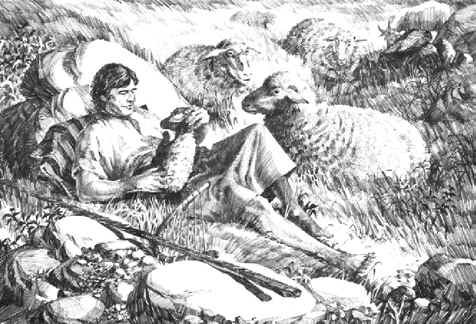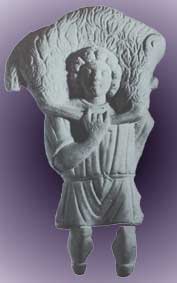The Bible: The Lord Is My Shepherd
One of the best-loved passages in the Bible is Psalm 23. Its simple affirmation of complete trust and confidence in God has inspired countless people from generation to generation.
Psalm 23 relies on two familiar metaphors for its effectiveness: God as Shepherd and God as Host. This combination would have been particularly effective to its Hebrew audience, since the shepherd motif was closely related to the host motif in ancient Near Eastern thought.
Titled simply “A Psalm of David,” this psalm has universal appeal, bringing comfort to all who have experienced periods of deep trouble in life. The first verse summarizes the essence of the psalm: “The Lord is my shepherd, I shall not be in want.”
 |
| David’s role as shepherd prefigures Jesus Christ (John 10:11, 14). The shepherd metaphor culminates in the book of Revelation: “The Lamb [Jesus Christ] at the center of the throne will be their shepherd; he will lead them to springs of living water. And God will wipe away every tear from their eyes” (Revelation 7:17). Illustration by Ken Tunell |
This statement is only four words long in the Hebrew, yet it says so much. David was a shepherd. He knew that a good shepherd is personally involved with the welfare of his sheep, protecting and providing for them. David portrayed God in the role of a good shepherd, caring for his people. With God as his shepherd, David could want for nothing.
The shepherd metaphor is developed further: “He makes me lie down in green pastures, he leads me beside quiet waters. He restores my soul” (verses 2-3).
As Willem A. VanGemeren writes: “The ‘green pastures’ are the rich and verdant pastures, where the sheep need not move from place to place to be satisfied…. The sheep have time to rest, as the shepherd makes them to ‘lie down.’ The ‘quiet waters’ are the wells and springs where the sheep can drink without being rushed” (“Psalms,” in The Expositor’s Bible Commentary, vol. 5, p. 216).
Articles in “Exploring the Word of God: Books of Poetry and Wisdom” |
By leading the sheep to green pastures and still waters, the shepherd restores or rejuvenates the sheep. David claims that God similarly restores his innermost being. The effectiveness of this metaphor lies in its simplicity and familiarity. God diligently shepherds his people and lovingly watches over them.
David now extends the metaphor to emphasize the shepherd’s role as the guide of the sheep: “He guides me in paths of righteousness for his name’s sake” (verse 3). The shepherd knows the right paths on which to lead the sheep to the green pastures. Similarly, God leads us along the path to eternal life. We need to ask God daily for his direction. As David prayed: “Direct me in the path of your commands, for there I find delight. Turn my heart toward your statutes and not toward selfish gain” (Psalm 119:35-36).
The fourth verse concludes the shepherd metaphor: “Even though I walk through the valley of the shadow of death, I will fear no evil, for you are with me; your rod and your staff, they comfort me.” The phrase “shadow of death,” which can also be translated “deep darkness,” is used figuratively of extreme danger. The right path may lead through ravines and river valleys where steep slopes block out the sun; the presence of the shepherd, however, calms the sheep. Similarly, we may go through great trials in life, but God is always there to help us.
According to Abraham Cohen, the rod is “a club with which to drive off beasts of prey which attack the sheep” (The Psalms, Soncino Books of the Bible, p. 68). David was undoubtedly skilled in using the rod and may have used it to kill a lion and a bear that attacked the flock he was watching (1 Samuel 17:34-37).
Shepherds also carried a staff. They probably used it to lean on when necessary, but it also served to keep the sheep on the right path. We can rely on God to protect us from what we are unable to face alone. In this context, Jesus Christ used the shepherd metaphor when he said: “I am the good shepherd. The good shepherd lays down his life for the sheep…. I am the good shepherd; I know my sheep and my sheep know me” (John 10:11, 14).
The next verse of Psalm 23 begins a second metaphor, that of God as Host: “You prepare a table before me in the presence of my enemies. You anoint my head with oil; my cup overflows” (verse 5).
A host would anoint the head of a guest as a mark of special honor, a custom that continued in Christ’s day (see Luke 7:46). The overflowing cup symbolized the superabundance the host had in store for the guests. Jesus likened the kingdom of heaven to a wedding banquet (Matthew 22:1-2). Those who follow God’s way of life can enjoy unlimited blessings as guests in the kingdom of God.
 |
| Skillfully rendered in a marble statue, a young shepherd boy returns his lost sheep to the fold. To help people understand one of the major purposes of his ministry, Jesus compared the good shepherd searching for a lost sheep with his mission to save humanity. “If a man owns a hundred sheep, and one of them wanders away, will he not leave the ninety-nine on the hills and go to look for the one that wandered off? And if he finds it, I tell you the truth, he is happier about that one sheep than about the ninety-nine that did not wander off” (Matthew 18:12-13). |
Psalm 23 concludes, “Surely goodness and love will follow me all the days of my life, and I will dwell in the house of the Lord forever” (verse 6). The New Testament uses the same metaphor of dwelling in God’s house forever: Those who have been made righteous by the blood of the Lamb, Jesus Christ, “are before the throne of God and serve him day and night in his temple; and he who sits on the throne will spread his tent over them. Never again will they hunger; never again will they thirst. The sun will not beat upon them, nor any scorching heat. For the Lamb at the center of the throne will be their shepherd; he will lead them to springs of living water” (Revelation 7:15-17).
Dwelling in God’s house and enjoying abundance go hand in hand. Notice that the passage in Revelation also uses the shepherd theme of the first part of Psalm 23. Throughout its pages, the Bible uses and combines various metaphors to express the great reward that awaits those who follow God’s way of life.
Psalm 23 rightly claims its place as one of the best-loved psalms. Its simple trust in God to lead the way, even through the darkest hour, and its joyous representation of God’s blessings can help strengthen the faith of anyone, even in the most trying of circumstances.

